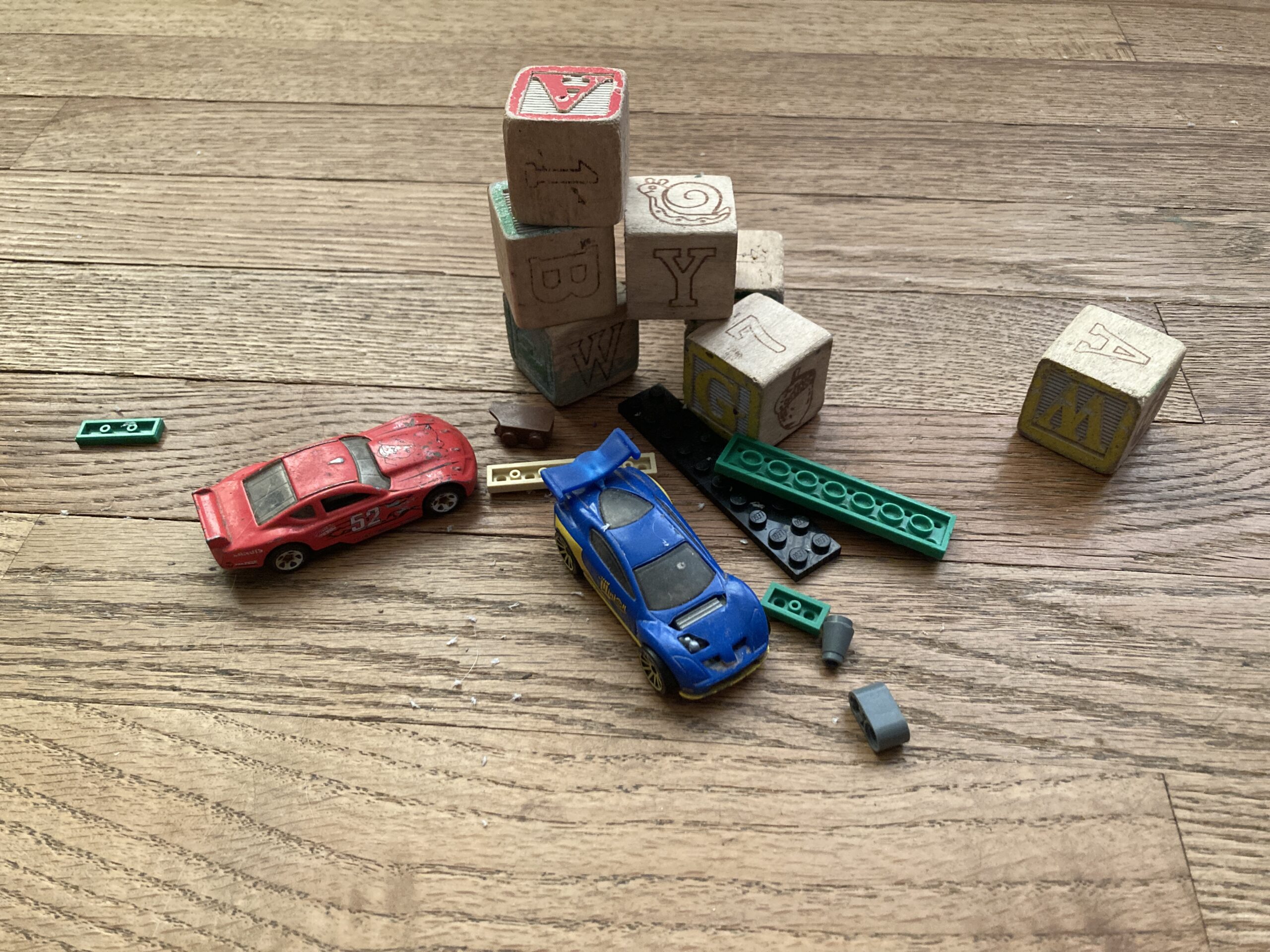Part 1: Forgiveness
I stopped making dinner and followed the sounds of screaming into the living room where I came upon yet another knock-down drag-out fight between my two youngest who had, apparently, engaged prison rules. There was some question as to who rightly owned the little red Matchbox pick-up truck as if it were the last crumb of food in a desert during a famine and they were each attempting to gouge each other’s eyes over it. The older kids and I separated the two combatants, a blue Matchbox pick-up truck was introduced to the youngest as an alternative to the coveted red pick-up and she happily accepted it. Within seconds of trying to manslaughter each other, the two were cheerfully playing side by side again, each with their own pick-up, as if they hadn’t just tried to rip each other apart over a piece of painted tin.
Young children are forgiving creatures. It is amazing just how forgiving they are, especially since we only have adults to compare them to. For example:
- Children: A child gets the present of his dreams, excitedly jumping up and down at the mere sight of his new treasure. Five minutes later, his mother accidentally steps on it and destroys it. She feels horrible and apologizes to her inconsolable child over and over. He immediately forgives her and ends up comforting her. Ten minutes later, he’s happily running around the house playing with an empty toilet paper roll, the entire horrific scene already forgotten.
- Adults: A woman forgets to send a thank you card to her mother-in-law for a present she never received because it was sent to the other daughter-in-law. Regardless, the mother-in-law still brings it up from time to time, decades later, with much bitterness.
- Children: Two kids call each other the worst names possible in the world of childhood such as doody head, fart nose, fatty and – the queen mother of all insults – tattletale. Seconds later, all is forgiven and they’re laughing together at a Youtube video about squirrels stealing Amazon packages off people’s porches.
- Adults: One adult tells another he likes carrot cake. The other adult makes the assumption that carrot-cake-lover looks down on him for not liking carrot cake and resents carrot-cake-lover to his dying day.
- Children: Enjoying a walk with a parent, a child breaks free from their parent’s grasp and tries to race into the street. The parent grabs them before they make it, frustrating the goal of the child, and gives the child a swat on the butt to ensure the child understands the importance of not breaking free and running into the street. The child continues enjoying the walk with their parent as if the entire momentary escape and ensuing punishment hadn’t occurred.
- Adults: The adult child goes against how they were raised and ignores any and all parental advice. They make a mess of their lives. They blame their parents for it and stop speaking to them. The parents have no idea what the heck happened.
What is it about humans that makes us trade the relative peace and serenity of mind that comes from forgiving for bitterness and hardness of heart that comes from not forgiving? At some point, when our brother kicks over our tower of blocks, we stop saying, “Man, that was messed up. But oh well, we’ll have some lunch and then go build another tower together.” Instead, we hang onto the slight and then the next one and the next one and then the next one until years of knocked over block towers finally comes out in an alcohol-fueled argument at Thanksgiving dinner that ends with fisticuffs on the back porch and a drop-kicked turkey. Or worse….
Worse being when we let those knocked over towers eat away at us until we take offense at nearly everything our brother does or says. No matter how innocent the statement – “I took Mom out to lunch for her birthday and that sandwich place had good burgers.” – we assume the worst in it. “Is he trying to tell me what a better son he is because he took mom out for her birthday? Is he trying to rub in my face how much money he makes by telling me he went to that restaurant? Why is he telling me how good the burgers are, like I care? He knows I like chicken sandwiches. That’s just like him to try and force what he likes on me like my opinion doesn’t matter.”
All this and our brother never even knows we harbor any resentment! He thought he was giving a recommendation for a place that made good burgers. And the fact that he doesn’t even know what an insensitive poop he is makes us all the madder.
Why do we trade our easygoing forgiving natures for rigid unforgiving natures that keep us up all night replaying slights over and over in our heads until we’ve magnified them into capital crimes?
Why do we destroy relationships with our inflexibility and our prickliness all while insisting that we’re the reasonable ones and it’s always the offending person that’s toxic?
Observing my children, I daily see fantastic examples of Christ’s exhortation to forgive not just 7 times but 70 times 7. Does all their letting bygones be bygones make them door mats or losers or chumps? No. It makes them free.
We make prisons for ourselves out of resentment, over-sensitivity, bitterness and victimhood. The bars are usually coated in self-righteousness, making them hard to see, but they’re there.
Children carry none of that around. They figure out that little Pete throws loose Legos when you touch his Lego creations and they adjust themselves accordingly. They might still touch that Lego house, but they know to duck when Pete starts pelting them with the little plastic bricks. And they don’t hold it against Pete. That’s just Pete. He throws Legos. Sally pinches. Tommy spits. Madeline is a puncher. However, these are not their defining qualities. These are vices we all hope they can master but until they do, we don’t take them personally. Pete is bad tempered with his Legos, but he’s very sociable and fun in nearly every other situation. His throwing Legos in no way reflects on the other person. It reflects on Pete. If the kids don’t want Pete to throw Legos, they don’t mess with his Lego creations.
Children don’t take it personally and I think that’s the secret. I’ve noticed that as they get older, my children start to take arguments and name-calling personally. This coincides with their decreasing ability to laugh off slights and increasing tendency to hold grudges.
We’re all broken human beings and two broken human beings, given enough time together, are apt to rub each other the wrong way. But we don’t have to take it personally.
When our mother makes a comment about how we always play the martyr, we can look within ourselves and say, “Is this something that I do? Is it something I need to work on?” If so, we can be grateful for the constructive feedback and work on not playing the martyr.
If not, we can chalk it up as another broken person being broken and not really knowing us that well. Maybe even pray for that other person. It can’t be pleasant being the type of human being that says things like that to other people unsolicited.
It also helps to think of all the stupid things we have said and try to forgive other people as we hope other people have forgiven us.
Jesus came to free us. The advice he gives sets us free. We can argue with him about his advice, but we’re not going to win. We’re not going to come up with a worse scenario than being horribly tortured and crucified by a group of people. If there was ever a situation in which someone could write off the other people as toxic, that would be it. And yet, Jesus didn’t. He forgave those fools while asphyxiating on the very cross to which they’d nailed him!
Despite his unbelievable example, we can still refuse to take Jesus’s advice (gotta love free will). But that would only serve to keep us enslaved to our grudges and mired down by needlessly carrying the weight of other people’s behaviors upon our shoulders. Who wants to live like that?
Jesus said to be like little children. It is the nature of a child to forgive. Ipso facto, Jesus wants us to make it the nature of an adult to forgive. Even after being pelted by Legos or having a hamburger recommended to us.





0 Comments